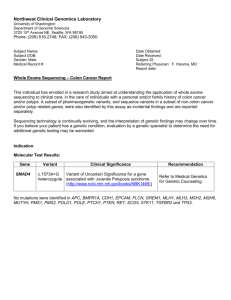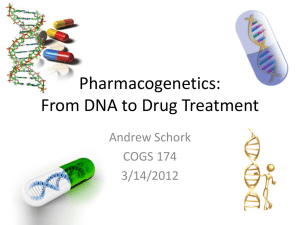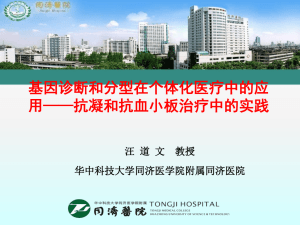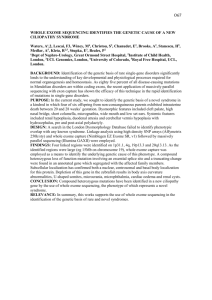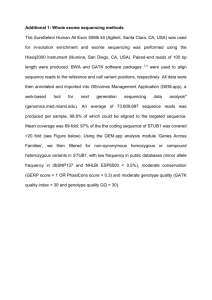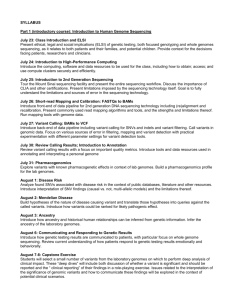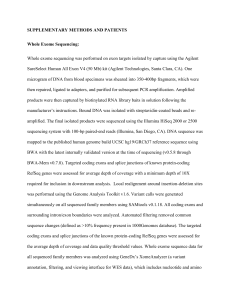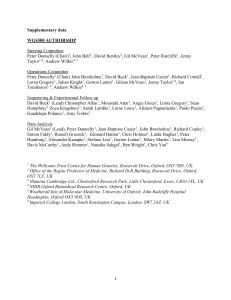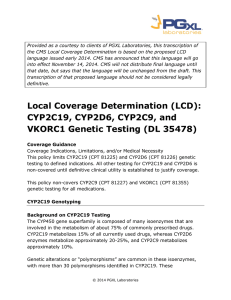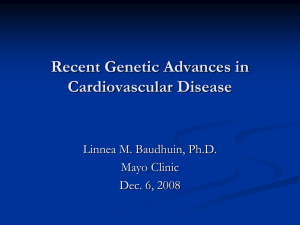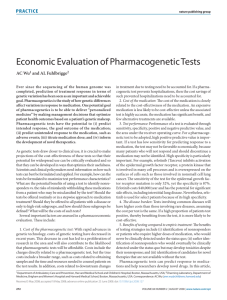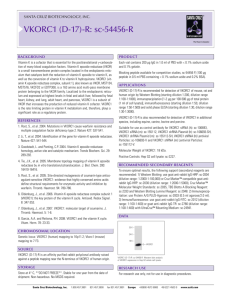Report Template for Positive Incidental Finding result
advertisement
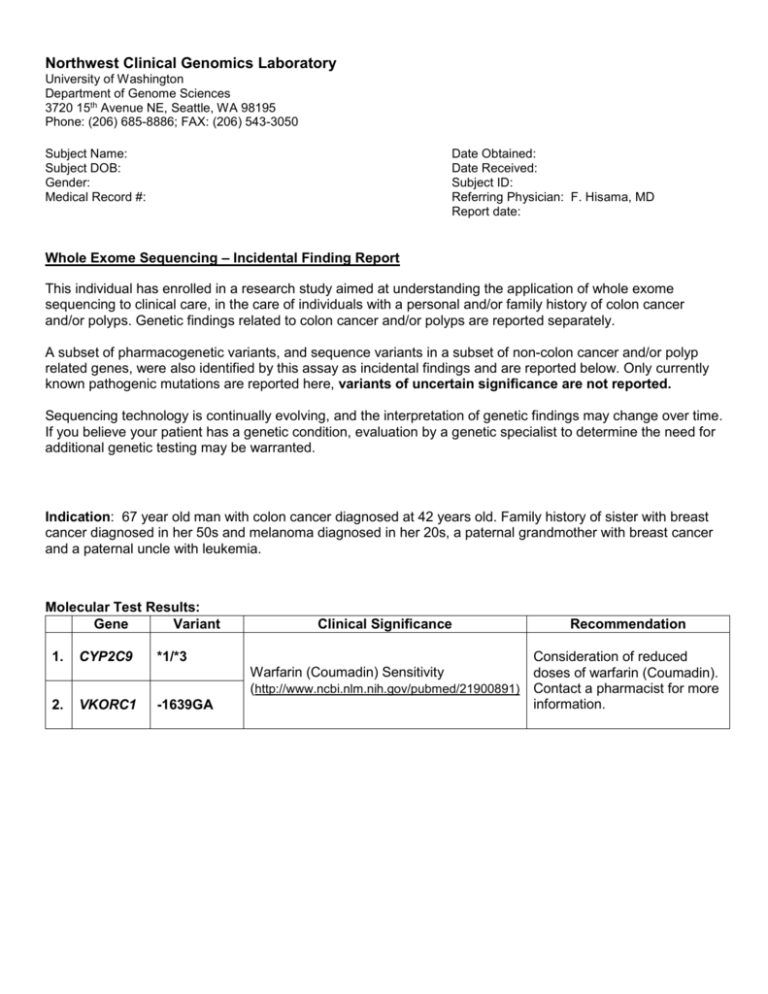
Northwest Clinical Genomics Laboratory University of Washington Department of Genome Sciences 3720 15th Avenue NE, Seattle, WA 98195 Phone: (206) 685-8886; FAX: (206) 543-3050 Subject Name: Subject DOB: Gender: Medical Record #: Date Obtained: Date Received: Subject ID: Referring Physician: F. Hisama, MD Report date: Whole Exome Sequencing – Incidental Finding Report This individual has enrolled in a research study aimed at understanding the application of whole exome sequencing to clinical care, in the care of individuals with a personal and/or family history of colon cancer and/or polyps. Genetic findings related to colon cancer and/or polyps are reported separately. A subset of pharmacogenetic variants, and sequence variants in a subset of non-colon cancer and/or polyp related genes, were also identified by this assay as incidental findings and are reported below. Only currently known pathogenic mutations are reported here, variants of uncertain significance are not reported. Sequencing technology is continually evolving, and the interpretation of genetic findings may change over time. If you believe your patient has a genetic condition, evaluation by a genetic specialist to determine the need for additional genetic testing may be warranted. Indication: 67 year old man with colon cancer diagnosed at 42 years old. Family history of sister with breast cancer diagnosed in her 50s and melanoma diagnosed in her 20s, a paternal grandmother with breast cancer and a paternal uncle with leukemia. Molecular Test Results: Gene Variant 1. CYP2C9 *1/*3 2. VKORC1 -1639GA Clinical Significance Recommendation Consideration of reduced Warfarin (Coumadin) Sensitivity doses of warfarin (Coumadin). (http://www.ncbi.nlm.nih.gov/pubmed/21900891) Contact a pharmacist for more information. Interpretation: 1. & 2. CYP2C9 *1/*3 (rs1057910) and VKORC1 -1639GA (rs9923231) Gene and Chromosome Variant Position (hg19) CYP2C9 Genbank file: NM_000771.3 Chromosome 10 Chr10: 96741053 Nucleotide variant (1 = the A of the initiator methionine codon) *1 = Ref allele *3 = c.1075A>C Heterozygous Protein variant (1 = the initiator methionine, the first translated amino acid of the precursor protein) p.Ile359Leu Heterozygous The single nucleotide substitution described above results in the change of arginine to cysteine at position 144 of the amino acid sequence. Gene and Chromosome Variant Position (hg19) VKORC1 Genbank file: NM_024006.4 Chromosome 16 Chr16:31107689 Nucleotide variant (1 = the A of the initiator methionine codon) -1639G>A Heterozygous Protein variant (1 = the initiator methionine, the first translated amino acid of the precursor protein) N/A Gene variants in CYP2C9 and VKORC1 may affect the metabolism of several drugs, including warfarin (Coumadin). Warfarin is an anticoagulant that is used to prevent blood clots. This individual has CYP2C9 *1/*3. *1 is equivalent to the reference allele, and *3 is associated with decreased CYP2C9 enzyme activity. This individual has the VKORC1 promoter genotype (GA), which is associated with decreased VKORC1 enzyme activity. Decreased CYP2C9 and VKORC1 enzyme activity both lead to warfarin sensitivity and increased bleeding risk at standard doses1-3. Consideration of reduced doses of warfarin for warfarin-sensitive individuals is recommended. Recommendations: A variety of known and unknown genetic and environmental factors affect warfarin dosing. Several algorithms to estimate stable doses of warfarin have been developed that take into account CYP2C9 and VKORC1 enzyme activity. www.warfarindosing.org is a free website that provides estimates for warfarin dosing in patients starting therapy. The Clinical Pharmacogenetics Implementation Consortium has also published warfarin dosing guidelines based on CYP2C9 and VKORC1 causative variations, or mutations (http://www.ncbi.nlm.nih.gov/pubmed/21900891). References: 1. Warfarin dose and the pharmacogenomics of CYP2C9 and VKORC1 - rationale and perspectives. Tong Yin, and Toshiyuki Miyata. Thrombosis Research (2007) 120(1):1-10. Epub 2006 Dec 11. Review. 2. A novel functional VKORC1 promoter polymorphism is associated with inter-individual and inter-ethnic differences in warfarin sensitivity. Hsiang-Yu Yuan, Jin-Jer Chen, M.T. Michael Lee, Ju-Chieh Wung, Ying-Fu Chen, Min-Ji Charng, Ming-Jen Lu, Chi-Ren Hung, Chun-Yu Wei, Chien-Hsiun Chen, Jer-Yuarn Wu and Yuan-Tsong Chen Human Molecular Genetics (2005) Jul 1;14(13):1745-51. Epub 2005 May 11. 3. Genetic Determinants of Response to Warfarin during Initial Anticoagulation. Ute I. Schwarz, Marylyn D. Ritchie, Yuki Bradford, Chun Li, Scott M. Dudek, Amy Frye-Anderson, Richard B. Kim, Dan M. Roden, and C. Michael Stein. The New England Journal of Medicine (2008) 358(10): 999-1008. Test: Whole Exome Sequencing (WXS) WXS was performed in a research environment to screen the coding portion of the subject’s genome (exome) for DNA sequence variants in genes known to cause colon cancer and/or polyps. Sequence variants in a set of non-colon cancer or polyposis related ‘actionable genes’ were also identified by this assay as incidental findings. These actionable genes were chosen based on their association with adult onset conditions for which there is recommended screening and/or treatment. Thus, this individual’s exome was not comprehensively interrogated. Only pathogenic variants are reported for incidental findings—variants of uncertain significance are not returned. Positive findings were validated to clinical standards in a CLIA compliant laboratory; however, the performance characteristics of exome sequencing for negative results (the absence of mutations) were not validated to clinical standards in a CLIA compliant laboratory. This laboratory test was developed and its performance characteristics determined by the Northwest Clinical Genomics Laboratory (CLIA-certified). Consistent with laboratory-developed tests, this test has not been cleared or approved by the U.S. Food and Drug Administration. Procedure: I. Whole Exome Sequencing Genomic DNA was extracted from blood using standard procedures. A library of DNA fragments was constructed and enriched for protein and RNA coding portions of the human genome using the SeqCap EZ Exome v3.0 (NimbleGen) capture system. Paired-end sequencing of the enriched library was performed using standard TruSeq v3.0 (Illumina) chemistry on a HiSeq 2000 (Illumina) sequencer according to the manufacturer’s recommended protocol. Resulting sequences were aligned to the human genome reference (hg19) using the Burrows-Wheeler Aligner (BWA) and variants identified with the Genome Analysis Took Kit (GATK). A modified version of the SeattleSeq tool was used to annotate variants found within a defined set of colon cancer and actionable genes. Limitations: 1. This assay does not detect large deletions or duplications and has limited ability to identify small insertions and deletions. This test is also has limited ability to detect mosaicism. 2. The assay does not detect variants located: 1) outside the captured exome, 2) in regions of insufficient coverage, 3) in regions containing paralogous genes or pseudogenes, or 4) where the reference genome is inaccurate or contains gaps and insertions. 3. Variants of uncertain significance are not reported 4. Genes not associated with treatable genetic conditions at the time this test was performed were not analyzed II. Validation of Sequence Variants (CLIA-accredited) Primers based on the hg19 (February 2009) version of the human genome sequence, were used to amplify targets containing WXS-identified sequence variants. PCR-amplified fragments were sequenced using standard dye-terminator chemistry. __________________________________ Peter H. Byers, M.D. Laboratory Director ____________________________________ Michael O. Dorschner, Ph.D. Laboratory Director __________________________________ Laura Amendola, M.S., C.G.C. Licensed Genetic Counselor Contact Information: Northwest Clinical Genomics Laboratory University of Washington Laura Amendola, MS CGC Phone: (206) 685-8886; FAX: (206) 543-3050 EMAIL: lauraa7@uw.edu CLIA ID: 50D2050662 Genetic Medicine Clinic University of Washington Fuki Hisama, MD Robin Bennett, MS CGC Phone: (206) 598-4030; Fax: (206) 598-3269 EMAIL: fmh2@u.washington.edu robinb@u.washington.edu
